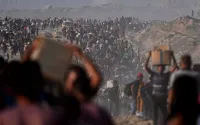International Herald Tribune, November 3, 2001
What set out to be an American war on terrorism has become a war against Afghanistan. The substitution of Afghanistan for terrorism, or the identification of the one with the other, is not only unjust but diverts U.S. policy from where it was intended to go, to where it is the most simple to go.
Afghanistan has been substituted for terrorism because Afghanistan is accessible to military power, and terrorism is not. The employment of high-tech munitions against irrelevant targets is a distraction from measures that actually deal with the threat.
"War" is feasible against Qaida, the clandestine association of like-minded Muslim fundamentalists led by Osama bin Laden, because it is a matter of police and intelligence work. Remarkable progress has been made during the last four weeks, thanks to unprecedented international cooperation.
However, Qaida is not identical with terrorism. Nor is bin Laden himself, even though Washington has cast him as the personification of evil. Terrorism is simply a form of violent political action, with political motives and objectives, and it is a recurrent phenomenon in history. Washington's inability to track down and seize or kill bin Laden is why the Taliban government has been substituted as America's enemy. The Kabul government's defiance is in turn responsible for the situation of frustration in which the United States finds itself, and which threatens to prove a damaging setback in more than one respect.
Fear of American air attacks have provoked a huge exodus of refugees from Afghanistan. The country is already suffering the consequences of a drought that has crippled its agriculture. The attacks themselves have made it all but impossible for relief agencies to go into the country. Misdirected bombings that have twice hit International Red Cross relief depots add to the misery the United States is inflicting upon these people, and for which international opinion holds it responsible.
The utility of the bombings is hard to defend. It was believed able to bring down the Taliban government, but that is not happening. There is no reason whatever to expect more bombs to make the Taliban authorities hand over bin Laden. The administration itself lacks confidence that an eventual ground expedition will seize him; Afghanistan is not Panama.
The original plan depended less on bombing than on organization of the existing military and political opposition; cutting off the support Pakistan was giving to the regime; and enlistment of the country's other neighbors, including Iran, all with ethnic or religious clients inside Afghanistan. The authority of the former king and the United Nations was to underwrite a new coalition government. This plan has suffered a series of setbacks, and official Washington is rapidly losing interest in political solutions. There is an increasing disposition toward brute force, and the use of whatever allies are at hand, even if that threatens to leave Afghanistan in chaos, and the war on terrorism stranded.
One might think it sensible to change a policy that is failing, but that is not the case in a government whose primordial motivation is to appease Congress and the media. Although bin Laden has not been found, operations against Qaida seem to be going well. An extensive apparatus for tracking terrorist communications, organizations and funding is being put into place. The United States and its allies could take advantage of these successes, and of the arrival of Ramadan and Afghanistan's harsh winter to suspend the bombings. The situation in Afghanistan and among Washington's Muslim allies could be allowed to evolve over the winter months. The result might prove constructive. Washington might take the time to reflect on its responsibility, which is to deal intelligently with the terrorist threat to the United States. Bin Laden and his group are merely instances of that threat. If he is killed, he will be replaced. The causes of terrorism will remain, and they are political. Afghanistan and its people are no threat to the United States, but they are the ones taking the full weight of America's indignation. The administration's priorities are upside-down.
Los Angeles Times Syndicate.






